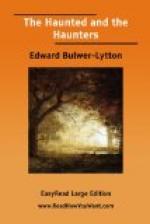The inscrutable woman who caused such general dismay in the parish was an object of much pity. Avoided, feared, and detested, she could find no rest for her weary feet, nor any shelter for her unprotected head. If she was seen approaching a house, the door and windows were immediately closed against her; if met on the way she was avoided as a pestilence. How she lived no one could tell, for none would permit themselves to know. It was asserted that she existed without meat or drink, and that she was doomed to remain possessed of life, the prey of hunger and thirst, until she could get some one weak enough to break the spell by drinking her hellish draught, to taste which, they said, would be to change places with herself, and assume her despair and misery.
There had lived in the country about six months before her appearance in it, a man named Stephenson. He was unmarried, and the last of his family. This person led a solitary and secluded life, and exhibited during the last years of his existence strong symptoms of eccentricity, which for some months before his death assumed a character of unquestionable derangement. He was found one morning hanging by a halter in his own stable, where he had, under the influence of his malady, committed suicide. At this time the public press had not, as now, familiarised the minds of the people to that dreadful crime, and it was consequently looked upon then with an intensity of horror of which we can scarcely entertain any adequate notion. His farm remained unoccupied, for while an acre of land could be obtained in any other quarter, no man would enter upon such unhallowed premises. The house was locked up, and it was currently reported that Stephenson and the devil each night repeated the hanging scene in the stable; and that when the former was committing the “hopeless sin,” the halter slipped several times from the beam of the stable-loft, when Satan came, in the shape of a dark-complexioned man with a hollow voice, and secured the rope until Stephenson’s end was accomplished.
In this stable did the wanderer take up her residence at night; and when we consider the belief of the people in the night-scenes which were supposed to occur in it, we need not be surprised at the new features of horror which this circumstance superadded to her character. Her presence and appearance in the parish were dreadful; a public outcry was soon raised against her, which, were it not from fear of her power over their lives and cattle, might have ended in her death. None, however, had courage to grapple with her, or to attempt expelling her by violence, lest a signal vengeance might be taken on any who dared to injure a woman that could call in the terrible aid of the Lianhan Shee.




